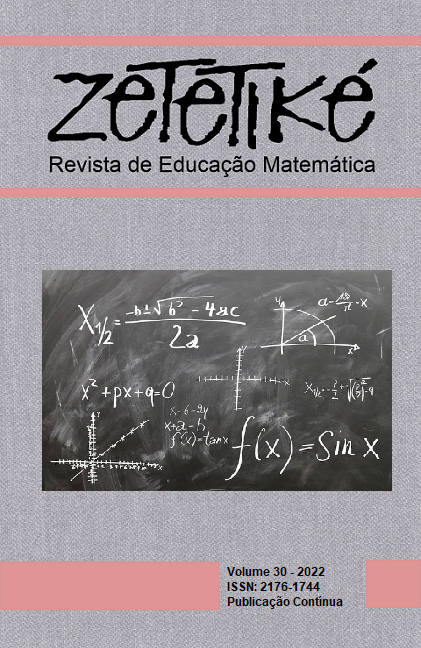Abstract
The current culture of information and technologies requires new approaches in education according to the demands of society. The current curriculum and the practices of studies in high school do not favor developing these necessary requirements for any citizen. In particular, in Argentina disappointing results are reported in relation to the performance of students in mathematics. In this work, based on the Anthropological Theory of the Didactic, an analysis of a situation for the functional study of mathematics is proposed. This proposal is in correspondence with the Argentinian high school renovation plan. In this work, a possible path of questions and answers is presented around a real situation. This is linked to the energy shortage. If you want to formulate questions in a strong sense, it is decided that on the ground they demand information as an answer, as well as the studio of useful tools to address them and generate new questions.
References
Artigue, M. (2008). Didactical Design in Mathematics Education. En: Nordic Research in Mathematics Education, 8. Copenhagen: Proceedings from NORMA08. (pp. 7-16.). Copenhagen: Sense Publishers, 21– 25 Apr.2008.
Artigue, M. (2013). La educación matemática como un campo de investigación y como un campo de práctica: Resultados, Desafíos. Cuadernos de Investigación y Formación en Educación Matemática, 8(11), 43-59.
Barquero, B., Bosch, M., & Romo, A. (2016). A study and research path on mathematical modelling for teacher education. En: Congress of the European Society for Research in Mathematics Education, 9. 2015. Prague. Proceedings of the Ninth Congress of the European Society for Research in Mathematics Education. (pp. 809-815). Prague: Charles University in Prague.
Blank, W. (1997). Authentic instruction. Tampa: University of South Florida.
Chevallard, Y. (1999) L’analyse des pratiques enseignantes en théorie anthropologique du didactique. Recherches en Didactique des Mathématiques, Grenoble, 19(2), 221-266.
Chevallard, Y. (2007). Passé et présent de la théorie anthropologique du didactique. En Ruiz-Higueras, L., Estepa, A. & Javier Garcia, F. (Ed.). Sociedad, Escuela y Mathemáticas. (p.705-746). Aportaciones de la Teoría Antropológica de lo Didáctico: Universidad de Jaén.
Chevallard, Y. (2013). Enseñar Matemáticas en la Sociedad de Mañana: Alegato a favor de un contraparadigma emergente. REDIMAT, 2 (2), 161-182.
Chevallard, Y. (2017). ¿Por qué enseñar matemáticas en secundaria? Una pregunta vital para los tiempos que se avecinan. La Gaceta de la RSME, 20 (1), 159–169.
Corica, A. (2018). Análisis de la gestión de un dispositivo didáctico formulado en el marco de la TAD. REVEMAT. 13(2), 54-71.
Corica, A., & Otero, M. (2019). Análisis de la gestión de un dispositivo didáctico por un estudiante de profesorado en matemática. BOLEMA, 33(63), 226-247.
D’Amore, B., Godino, J., & Fandiño, M. (2008). Competencias y matemáticas. Bogotá: Cooperativa Editorial Magisterio.
Dickinson, K., Soukamneuth, S., Yu, H., Kimball, M., D’amico, R., Perry, R., et al. (1998). Providing educational services in the Summer Youth Employment and Training Program (Technical assistance guide). Washington, DC: Department of Labor, Office of Policy & Research.
Dirección de Educación Secundaria de la Provincia de Buenos Aires. (2017). Saberes coordinados y aprendizaje basado en proyectos: hacia una enseñanza compartida para lograr aprendizajes integrados. Documentos de actualización curricular. Buenos Aires: Gobierno de la provincia de Buenos Aires.
Florensa, I., Bosch, M., Gascon, J., & Winsløw, C. (2018). Study and Research Paths: A New tool for Design and Management of Project Based Learning in Engineering. International Journal of Engineering Education, 34(6), 1848–1862.
Harwell, S. (1997). Project-based learning. In W.E. Blank & S. Harwell (Eds.), Promising practices for connecting high school to the real world (pp. 23–28). Tampa: University of South Florida.
Jessen, B. (2014). How can study and research paths contribute to the teaching of mathematics in an interdisciplinary settings? ANNALES de DIDACTIQUE et de SCIENCES COGNITIVES, 19, pp. 199 – 224.
Kilpatrick, W. (1967a) La teoría pedagógica en que se basa el programa escolar. En W. Kilpatrick, H. Rugg, G. Washburne & F. Bonner (Eds), El nuevo programa escolar (pp. 39-72). Buenos Aires: Editorial Losada.
Kilpatrick, W. (1967b) La filosofía de la educación desde el punto de vista experimentalista. En W. Kilpatrick, F. Breed, H. Horne & M. Adler (Eds), Filosofía de la Educación (pp. 15-74). Buenos Aires: Editorial Losada.
Ladage, C., & Chevallard, Y. (2010). La pédagogie de l’enquête dans l’éducation au développement durable. Recuperado el 11 de Octubre de 2019 de: http://yves.chevallard.free.fr/spip/spip/article.php3?id_article=180
Ley n° 26.473, de 17 de diciembre de 2008 (2008). Prohibe a partir del 31 de diciembre de 2010, la importacion y comercializacion de lamparas incandescentes de uso residencial general en todo el territorio de la republica argentina. Presidencia de la Nación Argentina.
Ministerio de Educación de la Nación. (2017). Marco de Organización de los Aprendizajes para la Educación Obligatoria Argentina (MOA). Anexo Resolución CFE Nro 330/17. Buenos Aires: Presidencia de la Nación.
Pochulu, M. (2018). La modelización en Matemática: marco de referencia y aplicaciones. Villa María: GIDED.
Ruiz-Munzón, N. (2010). La introducción del álgebra elemental y su desarrollo hacia la modelización funcional. Tesis de doctorado. Universidad Autónoma de Barcelona.
Ruiz-Munzón, N., Bosch, M., & Gascón, J. (2011). Un modelo epistemológico de referencia del algebra como instrumento de modelización. En M. Bosch et al. (Eds.), Un panorama de la TAD (p. 743-765). Barcelona, España: Centre de Recerca Matemàtica.
Secretaría de Innovación y Calidad Educativa. (2018). Marco Nacional para la Mejora del Aprendizaje en Matemática. Buenos Aires: Ministerio de Educación, Cultura, Ciencia y Tecnología.
Winsløw, C., Matheron, Y., & Mercier, A. (2013). Study and research courses as an epistemological model for didactics. Educational Studies in Mathematics, 83(2), 267–284.

This work is licensed under a Creative Commons Attribution-NonCommercial-NoDerivatives 4.0 International License.
Copyright (c) 2022 Zetetiké


